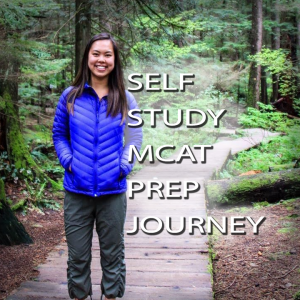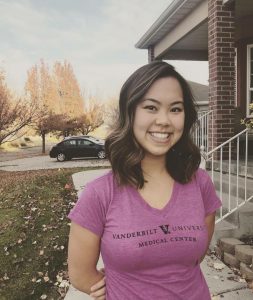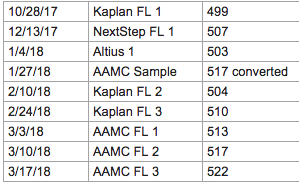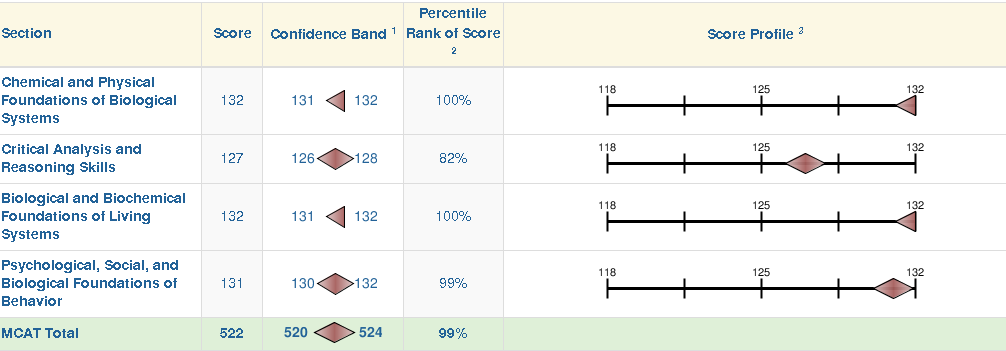You are unique! This makes your premed experience unique and your MCAT prep journey individual TO YOU!

What works for one student may not work for another, but this doesn't mean you can't learn from their experience, especially if they've already taken the time to evaluate an approach and provide feedback.
Meet LeAnn.
She started out in a rigorous biomedical engineering major and discovered her passion for medicine late in her junior year. This meant adding MCAT prep on top of an already hectic schedule.
LeAnn took the March 2018 MCAT and shares her journey below.
Remember this is HER journey! Don't feel that you must do as she did. Instead ask yourself “What can I learn from her experience?”
I decided that I truly wanted to go to medical school pretty late in the game as a second semester Junior.
My major was rigorous and I had great difficulty balancing full class loads, and extracurriculars. It took a lot of determination and discipline, which is easier said than done!
I self-studied.
I knew my personality and I knew that I could keep myself focused and determined.
Self-studying is not ideal for everyone, but for the people who think it's impossible – it is not!
It may seem overwhelming at first and take more time initially to set up a study plan,
but once I got in the flow of things it felt more structured.
By not having a prep course, I was forced to look at multiple resources and perspectives.
Therefore, on the actual test, I had a more holistic understanding of each topic rather than the one way it was defined in a book.
Where to Start
I kept telling myself it was impossible to learn everything on the MCAT.
And that's true, we can't learn everything.
BUT you can learn almost everything!
At the beginning of my prep, I was sad and frustrated every time I did poorly on a practice exam. I always asked,
‘Why can’t I just understand this material? It's useless to try to memorize all of this!”
I had to change my mindset and stop feeling bad for myself.
So instead, I visualized it as fixing the “kinks” in my MCAT armor.
I didn't want an Achilles heel, so every question I got wrong I had to see as an opportunity to shine up my armor!
On a practice test, every question wrong is one question I won't get wrong on the official exam!
This is when I really started to see my confidence increase!
A confident mind leads to confident test taking!
Then, what I didn't learn I could use critical thinking skills to reason through it.
My Self Study Plan
When I was trying to come up with a self study plan, I remember scouring the internet for any free resources.
I came across Leah’s website and found so many helpful things, concrete tips and recommendations:
- I utilized her 3 phase approach of content review, and the articles on how many hours it would require helped frame my study plan.
- (I also really loved her amino acid videos and the trick to find the isoelectric point because I was soooo lost on that before watching those videos.)
- Lastly, Leah's posts about other student study plans and how they succeeded helped me realize that it is possible to do really well on the MCAT!
Learning HOW to Study
After reading the Kaplan books, I still felt like I didn't know the material well at all.
I was passively taking notes while reading.
When I started to make outlines for each section, it helped me retain the information SO MUCH BETTER.
In the next phase, I took the AAMC outline and started to fill in each bullet point.
I gained a sense of organization.
I looked for other resources online, and start to develop a more coherent “web” of MCAT material.
By the end of each outline, I had a list of questions I could review to retain the information.
I don't do well with flash cards, so I guess this was my version of “flash cards.”
Repetition is key.
I didn't truly retain any information until I repeatedly reviewed my outlines and tested myself.
It's not enough to read it once and take notes. Repeat, repeat, repeat!
Elaborative rehearsal is more than just memorizing. Come up with real life examples!
Leah's Note: Active Writing is a really good way to improve long-term memorization
My Resources
For content,
I heavily used Khan Academy for all sections because I’m a visual learner, but the most for P/S.
I also used online free textbooks from Boundless Lumen Learning and I had access to the Altius Study Manual.
I bought Kaplan books because they came with 3 practice exams. Kaplan was helpful for content review, but it was also overwhelming.
For practice,
NextStep “Strategy and Practice” books. The AAMC Bundle with Section Banks, Question Packs, and Flashcards were my go-to. I used some Princeton Review passages for CARS.
Also, a hidden gem that I think is SO USEFUL and free
is the MCAT Podcast by Dr. Ryan Gray (Medical School HQ)!
They partner with NextStep and do practice MCAT questions and more.
That was super helpful to listen to on my car ride to and from school.
Leah's Note: Podcasts are great for review on the go. Here are a few more time hacks for studying when you travel, do chores, work out and more.
Also, my major required many research papers – this really helped.
Leah's Note: Scientific Journal reading is key to preparing for MCAT style passage comprehension.
Near the end of my content, I referred to my college textbooks for more detailed info about concepts I felt weak in.
I studied for 6 months while having a full course load. For the first 3 months I studied for 10 hours a week. The last three months were 25-30 hours a week.
For the last month of studying, I solely utilized AAMC material.
This honed in how AAMC asks questions, see what they consider “high priority,”
and expose some of my weak areas.
For full length practice,
I took the NextStep, Altius, 3 Kaplan (came with the bookset), and the 4 AAMC exams. A total of 9 FLs before the actual exam.
NextStep: closest to the real thing.
Kaplan: way too focused on content; their CARS is harder than AAMC; made me ‘sweat’ the smallest details and took the focus off of research reasoning skills, which I didn't like. It was quite obvious that the scores are deflated on Kaplan.
Altius was the hardest of them all and the most deflated score.
But, these full lengths gave me practice for endurance.
AAMC practice:
The Sample test was the easiest and definitely easier than the actual test.
AAMC 1 – I only remember being really nervous due to mattering so much to me being the “first AAMC test.”
AAMC 2 – Only slightly easier than the actual test. It was more content while the official test was heavily passage and research based reasoning.
AAMC 3 – I thought this was most representative. I didn't feel very confident about my performance. Many questions I could narrow down to two choices and then had to use my best judgement.
Leah's Note: Check out my compiled list of great student-reviewed resources along with a 10% Next Step discount code.
Test Day Arrived…
Overall, I felt confident and as prepared as I could be.
There was a mix of difficult and easy passages, but for the most part they were fair.
There were only a couple questions from each section that I thought were ridiculous.
C/P
I felt like there was more “low yield” material than I expected.
More physics heavy. A few passages heavy on calculations and specific physics questions.
This is usually my best section and I had a freak out moment for the first 5 questions!
Luckily, I reminded myself that I should just skip it and move on. That prevented me from losing too much time on it, and I was able to finish the other passages which boosted my confidence.
CARS
Overall, I thought CARS was fair and most representative of what I'd seen on AAMC Full lengths and the CARS Question Packs.
Some people thought it was boring, but I didn't. Maybe 1 or 2 of them were more confusing than the others.
I also did feel like the passages were longer than the Question Packs, but it could have just been the screen
Of all the sections, I thought this best reflected AAMC material.
B/B
Section Banks definitely were the best prep for this section.
I felt like this was slightly harder than the AAMC full lengths, but not as difficult as the Section Banks.
There were definitely 1 or 2 passages that were Section Bank level, a lot of abbreviations that sounded the same, and multi-step problems.
It was heavily weighted towards research articles with multiple steps (A activates B which activates C, but D inactivates B in X situation.)
It helped write down the steps on my scratch paper as I was reading the passage.
I referred to this simplified “flow chart” on questions and didn't get confused by rereading the passage.
Again, I was a little surprised at some of the “low yield” stuff that popped up.
P/S
I felt really great on this section. It really came down to “Do you know the definition of these terms?”
You had to know the definition because they put terms that sounded similar to someone who hadn't truly studied the definitions.
I felt like it was slightly more sociology than most AAMC exams.
Again, stuff I thought was “high yield” didn't pop up.
Looking back – Advice to students about to test
- Practice the full lengths with less time. In practice I'd finish early, on test day I took the full time.
- Definitely do all of the AAMC material! Especially, Section Banks!
- You can't “cram” for CARS. It takes time to orient your mind to actively read and think like an AAMC writer. (It scared me but about 3 months before my test day, I started to do 3 passages a day. Then I bumped it up to 4 and then 5 a day. That really helped boost my confidence and reading skills.)
- Contrary to practice tests, on the official test, after your break you get two minutes to hit ‘next.’ Use these to breathe, calm down, and mentally prepare for the next section.
- Practice with foam EARPLUGS (Amazon).
A lot of people bang their mouse, load keyboards clicks, and cough.
It probably would've driven me nuts. Luckily, I practiced with them and was comfortable on test day. (Originally, it was “eerie quiet.” I could literally hear myself think. But I became accustomed and used them for all the sections on test day. - Bring tylenol and any emergency items on test day. I got a nasty headache at the end of C/P and I'm glad I was prepared with ibuprofen.
- One of my keys to success was ASKING my peers for advice on how they studied, what methods worked for them, etc.! I was so grateful. It helped me see how varied everyone's approach was, and I chose which methods would work best for me.
- Keep a dynamic study schedule. Things change from week to week! One of my favorite quotes is “Stay rigid in your goal, but flexible in how you get there.”
- COLLABORATION NOT COMPETITION. I feel like people are so secretive with their MCAT scores and preparation; I don't get it. We are all in this together, we need to support each other. Do your due diligence and help other people who are seeking advice.
- Lastly, Stop being scared of the exam. For so long I was scared of starting, and that held me back. You are capable of achieving your target score. It won't be easy, but it is possible. It takes hard work, dedication, and determination.
I want to share my practice scores with you to show it IS possible to go from less than 500 to the 99th percentile!

Here are my final official scores:

I hope my experience can be an encouragement to you!
I want to hear from you!
I interview students after EVERY SINGLE exam date to ensure I am in the best position to help you. What type of questions should I ask students in the future?
Also, what was your biggest takeaway from LeAnn's experience?
Let me know in the comments below



She says in the article that she found it very helpful to make outlines about sections. What does that consist of? Any tips there?
That was all extremely good advice and more helpful than you may ever imagine. As I prepare for the MCAT myself, I love to hear other people experiences and study habits,etc. This way I can try to find what combination may work for me, or if I will even do something entirely different. I already had considered earplugs the day of the MCAT being I use them when I study sometimes as it is, but having ibuprofen with you in case of a headache was great advice, I sure could see that happening! Thank you very much for sharing, that was awesome! (Thank you both!)
William: That’s exactly what I hoped students would take from this. See what you can apply to you and test it out. Glad you found it helpful
Thank you so much for sharing your experience, LeAnn. I have been self-studying for the MCAT for about 3 months (~20 hours per week) and have started to get nervous because I haven’t seen the score improvement that I’m hoping to achieve. It was really helpful to hear about your whole studying process, especially your success without taking an expensive MCAT course. Also thanks to Leah for sharing!
You are very welcome Alexa!
Biggest takeaway: Hope. Thanks!
That’s a great takeaway Uz!
Thanks fo you both for thisartucley. Ehat is the AAMC outline mentioned by LeAnn which she filled out during her prep? Thanks
It’s on their website: https://students-residents.aamc.org/applying-medical-school/article/whats-mcat-exam/
Biggest takeaways – resources and practice tests used, thoughts about how resources compared to the real test, hours studied/number of hours spent on which resources, and the additional advice at the end!! Thanks Leah and LeAnn!
You’re very welcome Saj!